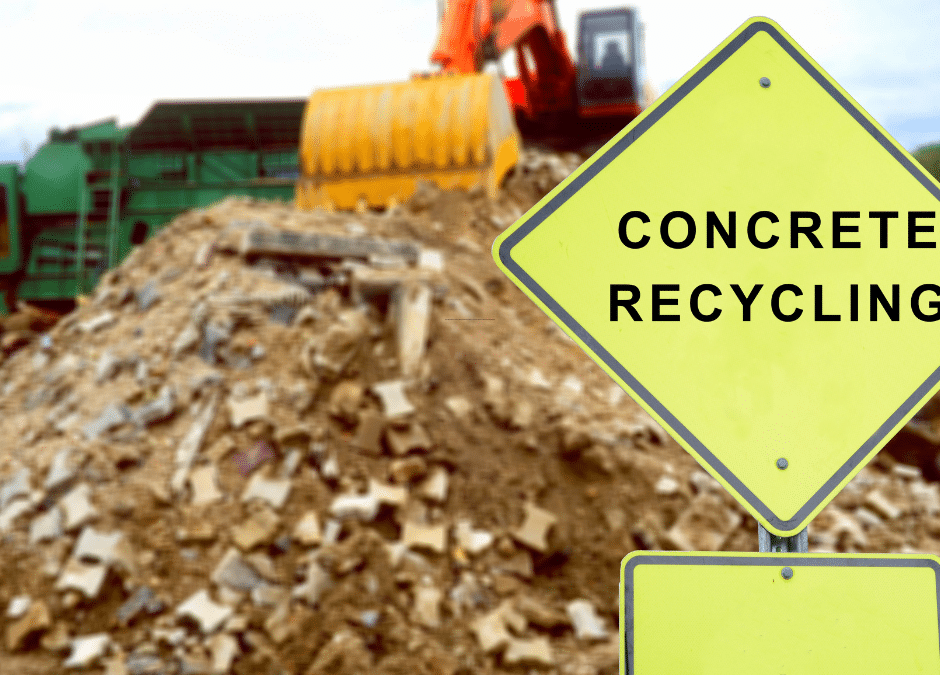In the evolving construction industry, sustainability is becoming increasingly important. Recycled concrete, as a pivotal component of green building materials, offers a pathway to more sustainable construction practices. Jacksonville Gravel is at the forefront, providing high-quality recycled concrete that supports both the environment and your budget. This guide will delve into the numerous benefits of using recycled concrete in your projects, from economic advantages to environmental impacts. Learn why more businesses are choosing recycled concrete for their construction needs.
What is Recycled Concrete?
Recycled concrete comes from the demolition of existing structures and is processed to remove debris and reinforce steel, leaving behind a high-quality material. This process involves crushing the concrete to a specified size and using it in new construction and landscaping projects, promoting sustainability in the industry. By repurposing materials that would otherwise contribute to landfill waste, recycled concrete not only aids in waste reduction but also in resource conservation. It is a prime example of circular economy practices in construction. As more contractors and developers adopt sustainable materials, recycled concrete is becoming a staple in green buildings.
Environmental Benefits of Recycled Concrete
Using recycled concrete significantly reduces landfill waste and the extraction of virgin materials. It minimizes the environmental footprint of construction projects by lowering the need for new materials and the energy used in their production. This eco-friendly approach aligns with global sustainability goals, reducing overall carbon emissions. Moreover, by decreasing the quarrying and mining for new aggregates, recycled concrete lessens the disruption to wildlife habitats and conserves natural resources. These environmental savings make a compelling case for choosing recycled over new materials.
Cost Benefits of Using Recycled Concrete
Recycled concrete is not only environmentally friendly but also cost-effective. It generally costs less than newly mined aggregate, which can lead to substantial savings on project budgets. Additionally, because it often comes from local sources, the associated transportation costs and energy use are reduced, further lowering project expenses. The affordability of recycled concrete makes it an attractive option for large-scale projects where cost savings are a priority. Furthermore, the reduced environmental impact fees and potential tax incentives for using sustainable materials add to the financial benefits.
Structural Integrity and Durability
Despite common misconceptions, recycled concrete provides excellent structural integrity and can be used in various load-bearing applications. It often meets or exceeds the performance specifications of traditional concrete, making it a reliable choice for a wide range of construction needs. This durability ensures that structures built with recycled concrete are robust and long-lasting. Extensive testing and real-world applications have demonstrated that recycled concrete maintains its integrity over time, even under harsh conditions. This makes it a smart choice for everything from foundational material to aesthetic architectural elements.
Versatility of Recycled Concrete
Recycled concrete’s versatility allows it to be used in many aspects of construction and landscaping. From being a base material for roads and driveways to an aesthetic addition in garden pathways and walls, it adapts to various uses, proving its utility in diverse project types. Its application is not limited to large commercial projects; homeowners and small businesses can also utilize recycled concrete for renovations and improvements. This adaptability also extends to environmental projects, where it can be used for erosion control and water filtration systems. The wide range of uses makes recycled concrete a flexible and practical choice for nearly any building or landscaping project.
Reducing Construction-Related Pollution
Opting for recycled concrete helps significantly reduce construction-related pollution. By reusing existing materials, the production of dust and particulate matter from mining new aggregates is minimized. This choice not only benefits the environment but also improves air quality at construction sites. It contributes to a healthier work environment and lessens the overall impact of construction activities on nearby communities and ecosystems. Using recycled concrete is a step toward more responsible and less polluting construction practices.
Enhancing Green Building Credentials
Incorporating recycled concrete into your projects can enhance your green building credentials, contributing to LEED points and other environmental certification goals. It demonstrates a commitment to sustainable construction practices, making your projects more appealing to eco-conscious clients and stakeholders. Buildings that utilize recycled materials are often viewed more favorably by regulatory bodies, potentially easing the permitting process. This can lead to increased marketability and potentially higher property values. Promoting the use of recycled concrete helps the planet and boosts your business’s reputation in the competitive construction market.
Contact Us for Recycled Concrete Services
Recycled concrete is not just a material; it’s a sustainable construction solution that offers numerous benefits, from environmental to economic. Jacksonville Gravel is committed to advancing green building practices by providing high-quality recycled concrete that meets a variety of construction needs. Our expert team is here to help you understand how recycled concrete can be integrated into your projects, saving you money while reducing environmental impact. Reach out to us to explore the possibilities that recycled concrete offers for your construction projects.
